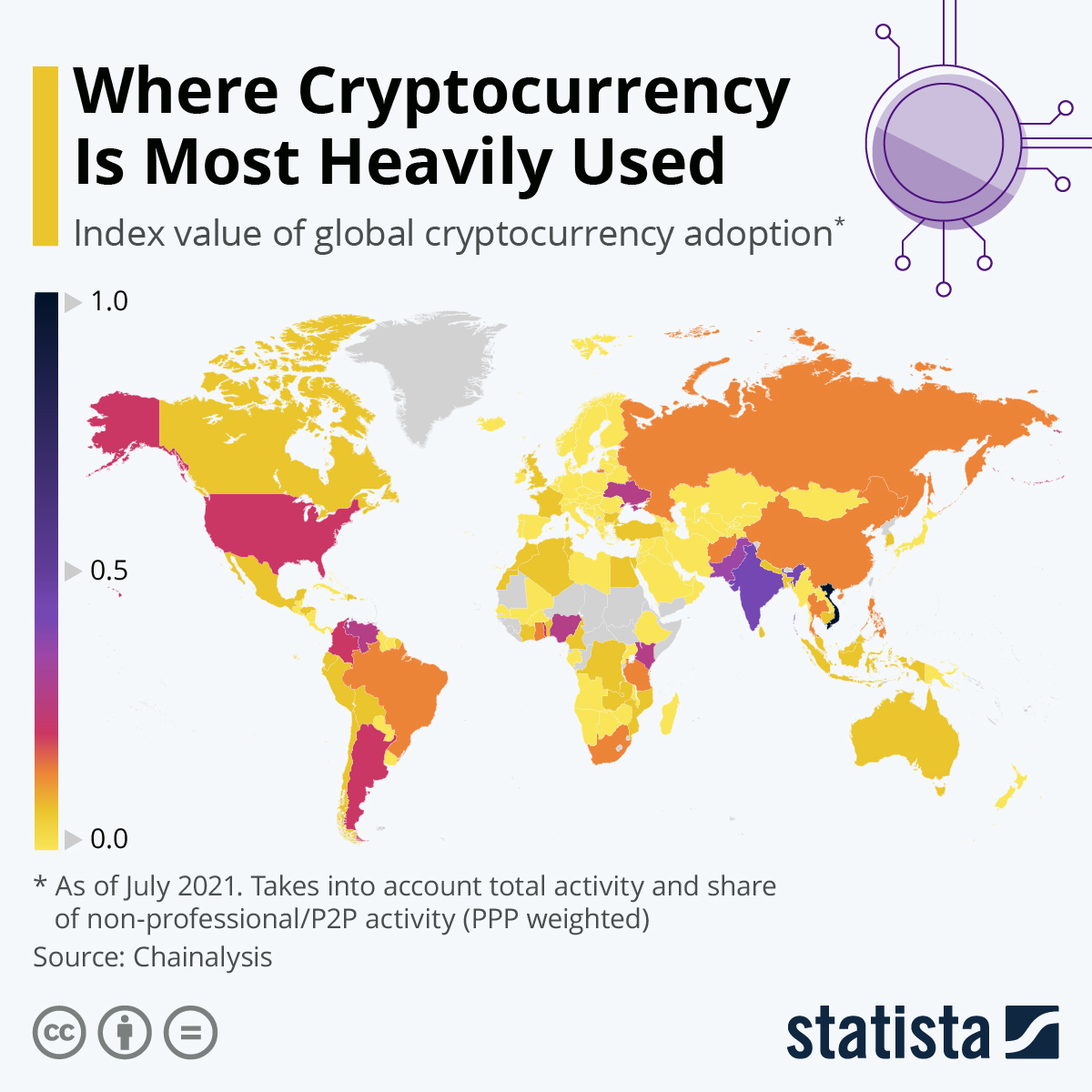The Yin and Yang of Crypto Regulation: TOP 10 Countries Impacting Global Crypto Market


This article explores the regulatory approaches taken by governments toward cryptocurrency and the impact on the digital currency market. It provides insights into the top countries regulating cryptocurrency and their strategies and examines the challenges and opportunities for compliance in a rapidly evolving landscape.
Cryptocurrency has been a rapidly growing market, but it is also an industry still trying to find its footing. As the popularity of digital currencies increases, governments worldwide have been grappling with how to regulate this new and innovative sector.
🇦🇪United Arab Emirates
The United Arab Emirates (UAE) has taken a proactive approach towards regulating cryptocurrency, with the country’s Securities and Commodities Authority (SCA) introducing guidelines for initial coin offerings (ICOs) in 2019. The guidelines provide clear requirements for companies looking to conduct ICOs in the country, including the need to register with the SCA and comply with strict disclosure and transparency requirements. Additionally, the UAE Central Bank has issued a framework for regulating virtual assets and the activities of virtual asset service providers, including cryptocurrency exchanges.
The impact of the UAE’s regulatory approach on the digital currency market has been positive, with the country emerging as a hub for blockchain and cryptocurrency innovation in the Middle East. The clear regulatory framework has provided businesses and investors with a sense of security and certainty, and has helped to establish the UAE as a destination for companies looking to expand into the region. However, there have also been challenges for businesses looking to operate in the UAE, with some finding it difficult to navigate the complex regulatory landscape. Nonetheless, the UAE’s proactive approach towards cryptocurrency regulation is likely to continue to attract investment and drive growth in the digital currency space in the years to come.
🇻🇳Vietnam
The Vietnamese government has taken a cautious approach towards cryptocurrency, with the State Bank of Vietnam (SBV) prohibiting the use of cryptocurrency as a means of payment in 2018. The government has also imposed strict regulations on cryptocurrency trading and mining activities, requiring businesses to obtain licenses and comply with anti-money laundering and counter-terrorism financing regulations. These measures have been put in place to protect investors and prevent financial crimes, but they have also limited the growth of the digital currency market in the country.
The impact of Vietnam’s regulatory approach on the digital currency market has been mixed. While the country has attracted some cryptocurrency businesses and investors, the strict regulations have also deterred many others. Some experts have also criticized the government for taking a heavy-handed approach towards the industry, arguing that it has hindered innovation and economic growth. Nonetheless, Vietnam’s government has shown a willingness to engage with the cryptocurrency industry and explore the potential benefits of blockchain technology. As the market continues to evolve, it will be interesting to see how the government’s approach towards regulation evolves as well.
🇺🇸United States
The regulatory approach towards cryptocurrency in the United States has been somewhat fragmented, with different agencies taking different approaches to regulating the industry. The Securities and Exchange Commission (SEC) has taken a cautious approach towards ICOs, viewing many of them as securities and requiring them to comply with securities regulations. Meanwhile, the Commodity Futures Trading Commission (CFTC) has taken a more permissive approach towards cryptocurrencies, viewing them as commodities and allowing for the trading of cryptocurrency derivatives.
The impact of the United States’ regulatory approach on the digital currency market has been mixed. While the regulatory framework has provided some level of certainty for businesses and investors, the lack of clarity and consistency in regulations has also led to confusion and uncertainty. Additionally, the high compliance costs and regulatory burdens have made it difficult for smaller businesses to enter the market. However, the US remains a major player in the global cryptocurrency market, with a number of leading cryptocurrency exchanges and businesses based in the country. It will be interesting to see how the regulatory landscape evolves in the coming years as the market continues to mature.
🇵🇭Philippines
The Philippines has been relatively progressive in its approach towards cryptocurrency regulation, with the country’s central bank, the Bangko Sentral ng Pilipinas (BSP), recognizing cryptocurrency as a legitimate payment method in 2017. The BSP has also issued guidelines for virtual currency exchanges, requiring them to register with the bank and comply with strict operational and security standards. Additionally, the country’s Securities and Exchange Commission (SEC) has issued regulations for ICOs, requiring them to be registered with the SEC and comply with disclosure and transparency requirements.
The impact of the Philippines’ regulatory approach on the digital currency market has been positive, with the country emerging as a hub for cryptocurrency innovation in Southeast Asia. The clear and supportive regulatory environment has attracted numerous businesses and investors to the country, and has helped to establish the Philippines as a leader in the digital currency space. However, there are still challenges for businesses looking to operate in the country, including the high compliance costs and regulatory burdens. Nonetheless, the Philippines’ proactive approach towards cryptocurrency regulation is likely to continue to drive growth in the market in the years to come.
🇮🇳India
India has had a tumultuous relationship with cryptocurrency, with the government initially taking a hardline stance against digital currencies. In 2018, the Reserve Bank of India (RBI) banned banks from dealing with cryptocurrency exchanges, effectively shutting down the industry in the country. However, this ban was lifted by the Supreme Court of India in 2020, leading to renewed interest in the cryptocurrency market.
The impact of India’s regulatory approach on the digital currency market has been mixed. While the lifting of the ban has allowed for the industry to begin to rebuild, there are still significant regulatory challenges facing businesses operating in the country. The government has signaled that it intends to introduce new regulations for the cryptocurrency industry, which could include restrictions on trading and mining. This uncertainty has made it difficult for businesses and investors to make long-term plans in the Indian market. However, given the country’s large and growing population, there is significant potential for growth in the cryptocurrency market in India, assuming that the government takes a supportive and reasonable approach to regulation.
🇸🇬Singapore
Singapore has taken a progressive approach towards cryptocurrency regulation, with the government recognizing the potential benefits of digital currencies while also seeking to manage the associated risks. The Monetary Authority of Singapore (MAS) has implemented a regulatory framework that requires cryptocurrency businesses to adhere to strict anti-money laundering (AML) and counter-terrorism financing (CTF) measures, while also providing a clear path for new businesses to enter the market.
This approach has had a positive impact on the digital currency market in Singapore, with the country becoming a hub for cryptocurrency businesses and investors in Asia. The regulatory framework has provided a level of trust and confidence for businesses and investors, while also ensuring that the industry is well-managed and protected against illegal activities. Singapore’s approach has been seen as a model for other countries to follow, and the country is likely to continue to be a major player in the global cryptocurrency market for the foreseeable future.
🇺🇦Ukraine
Ukraine has taken a relatively liberal approach towards cryptocurrency regulation, with the government recognizing the potential benefits of digital currencies and seeking to promote innovation in the industry. In 2020, the Ukrainian parliament passed a law that recognized cryptocurrencies as a legitimate financial instrument and provided a framework for the industry to operate within the country.
The impact of Ukraine’s regulatory approach on the digital currency market has been positive, with the country becoming a hub for cryptocurrency businesses and startups in Eastern Europe. The regulatory framework has provided a level of certainty and predictability for businesses and investors, while also allowing for innovation and experimentation in the industry. Ukraine’s approach has been praised by many in the cryptocurrency community as a model for other countries to follow. However, there are still some regulatory challenges facing the industry in Ukraine, including concerns around money laundering and other illegal activities. The government will need to remain vigilant in ensuring that the industry is well-managed and protected against these risks in order to continue to support the growth of the digital currency market in the country.
🇻🇪Venezuela
Venezuela has taken a unique approach towards cryptocurrency regulation, with the government seeking to use digital currencies as a tool to combat the country’s ongoing economic crisis. In 2018, the Venezuelan government launched its own cryptocurrency, the Petro, which is backed by the country’s oil reserves. The government has encouraged the use of the Petro within the country, and has even used it to pay government employees.
The impact of Venezuela’s regulatory approach on the digital currency market has been mixed. While the Petro has generated significant interest within the country, it has not gained widespread adoption outside of Venezuela, and many in the cryptocurrency community view it as a risky investment. Additionally, the country’s ongoing economic crisis has made it difficult for businesses and investors to operate within the country. The government’s use of the Petro has also been criticized as a potential tool for money laundering and other illegal activities. While Venezuela’s approach to cryptocurrency regulation is certainly unique, it remains to be seen whether it will ultimately have a positive impact on the country’s economy and the global cryptocurrency market.
🇹🇭Thailand
Thailand has taken a mixed approach towards cryptocurrency regulation, with the government seeking to balance the potential benefits of digital currencies with concerns around investor protection and illegal activities. In 2018, the government passed a law regulating digital assets, including cryptocurrencies, and created a regulatory framework for businesses operating in the industry.
The impact of Thailand’s regulatory approach on the digital currency market has been mixed. While the regulatory framework has provided some level of certainty and predictability for businesses and investors, it has also placed significant restrictions on the industry. For example, the law requires all digital asset businesses to register with the government and comply with strict Know Your Customer (KYC) and Anti-Money Laundering (AML) requirements. Additionally, the law places limits on the types of cryptocurrencies that can be traded within the country, which has led some businesses to look for opportunities elsewhere.
🇧🇷Brazil
Brazil has taken a relatively open approach to cryptocurrency regulation, with the government recognizing digital currencies as a legitimate asset class and allowing businesses to operate in the industry. In 2019, the Brazilian government passed a law regulating cryptocurrency exchanges and requiring them to register with the country’s financial regulator.
The impact of Brazil’s regulatory approach on the digital currency market has been largely positive, with the industry experiencing steady growth in recent years. The regulatory framework has provided businesses and investors with a level of certainty and stability, while also ensuring that illegal activities such as money laundering and terrorist financing are prevented. The government has also encouraged innovation and development in the industry, with initiatives aimed at supporting blockchain startups and promoting the use of digital currencies in the country.
Crypto Tax Rates in Top Countries by Bitcoin Users in 2023




Conclusions
In conclusion, the regulation of cryptocurrency varies greatly across different countries, with some governments implementing strict policies to control the market while others are more open and accepting. This diversity has significant impacts on the cryptocurrency market globally, as it affects adoption rates, trading volumes, and investor sentiment. For investors, it is essential to be aware of the regulatory environment in each country and the associated taxes and fees, as they can have a significant impact on the profitability of investments. Overall, as the cryptocurrency market continues to evolve and mature, it will be interesting to see how governments around the world adjust their policies and regulations to balance the benefits of innovation with the need for oversight and protection for investors and consumers.





